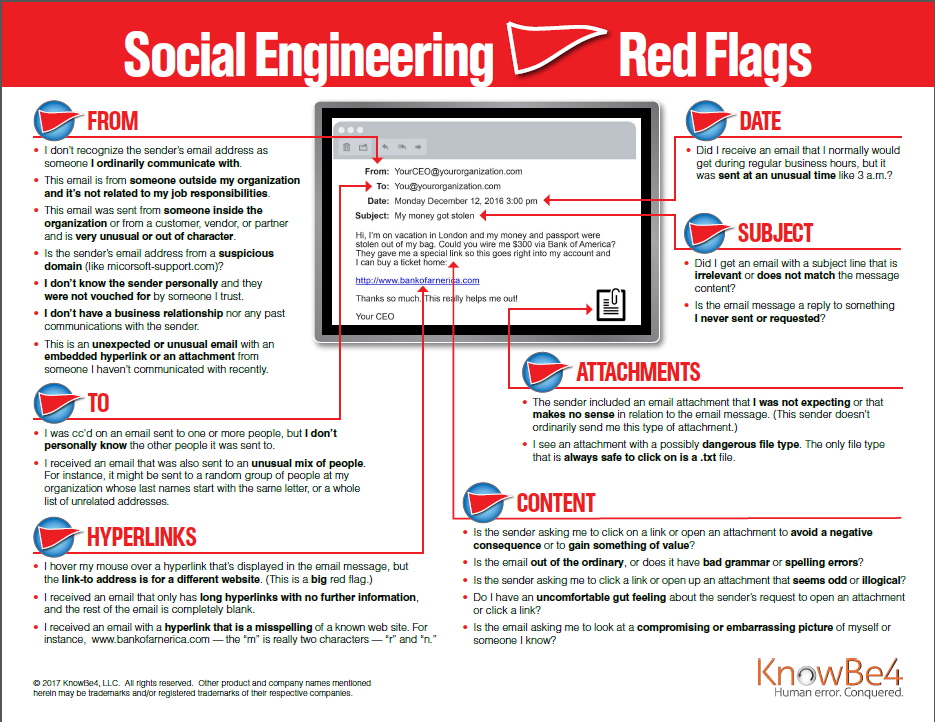Is it a malicious or phishing email?
- A phishing email asks you to perform an action. Usually the action is clicking on a link or opening an attachment. However, hackers can also ask you to wire money or forward confidential information.
- If you follow the action you experience financial loss, data loss or identify theft.
Before you click on a link or open an attachment:
- Give the email 100% of your attention
- Read the email on a large screen
- If you know the sender or they are a affiliated with MRU, contact them by phone to verify that they have sent the email
- If you know the organization, visit their website using a bookmark or Google search result
- If you do not know the sender, the organization or they are not affiliated with MRU consider it a phishing email
If you receive an email and you are not sure what to do with it, use the Processing Emails Flowchart. However, if it is not feasible or practical to follow these guidelines, look for phishing red flags before you click on a link or open an attachment.
If you receive an email with any of these red flags, it may be a phishing email.

From
- I don't recognize the sender's email address as someone I ordinarily communicate with
- This email is from someone outside my organization and it's not related to my job responsibilities
- This email was sent from someone inside the organization or from a customer vendor, or partner and is very unusual or out of character
- Is the sender's email address from a suspicious domain (like microsoft-support.com)?
- I don't know the sender personally and they were not vouched for by someone I trust
- I don't have a business relationship nor any past communications with the sender
- This is an unexpected or unusual email with an embedded hyperlink or an attachment from someone I haven't communicated with recently.
To
- I was cc'ed on an email sent to one or more people, but I don't personally know the other people it was sent to
- I received an email that was also sent to an unusual mix of people. For instance, it might be sent to a random group of people at my organization whose last names start with the same letter, or a whole list of unrelated addresses.
Hyperlinks
- I hover my mouse over a hyperlink that's displayed in the email message, but the l ink-to address is for a different website. (This is a big red flag.)
- I received an email that only has long hyperlinks with no further information and the rest of the email is completely blank.
- I received an email with a hyperlink that is misspelling of a known web site. For instance, www.bankofarnerica.com — the "m" is really two characters — "r" and "n"
Date
- Did I receive an email that I normally would get during regular business hours, but it was sent at an unusual time like 3 a.m.?
Subject
- Did I get an email with a subject line that is irrelevant or does not match the message content?
- Is the email message a reply to something I never sent or requested?
Attachments
- The sender included an email attachment that I was not expecting or that makes no sense in relation to the email message. (This sender doesn't ordinarily send me this type of attachment)
- I see an attachment with a possibly dangerous file type. The only file type that is always safe to click on is a .txt file.
Content
- Is the sender asking me to click on a link or open an attachment to avoid a negative consequence or to gain something of value?
- Is the email out of the orginary, or does it have bad grammar or spelling errors?
- Is the sender asking me to click a link or open up an attachment that seems odd or illogical?
- Do I have an uncomfortable gut feeling about the sender's request to open an attachment or click a link?
- Is the email asking me to look at a compromising or embarrassing picture of myself or someone I know?
If you receive a suspicious email, report the incident.

